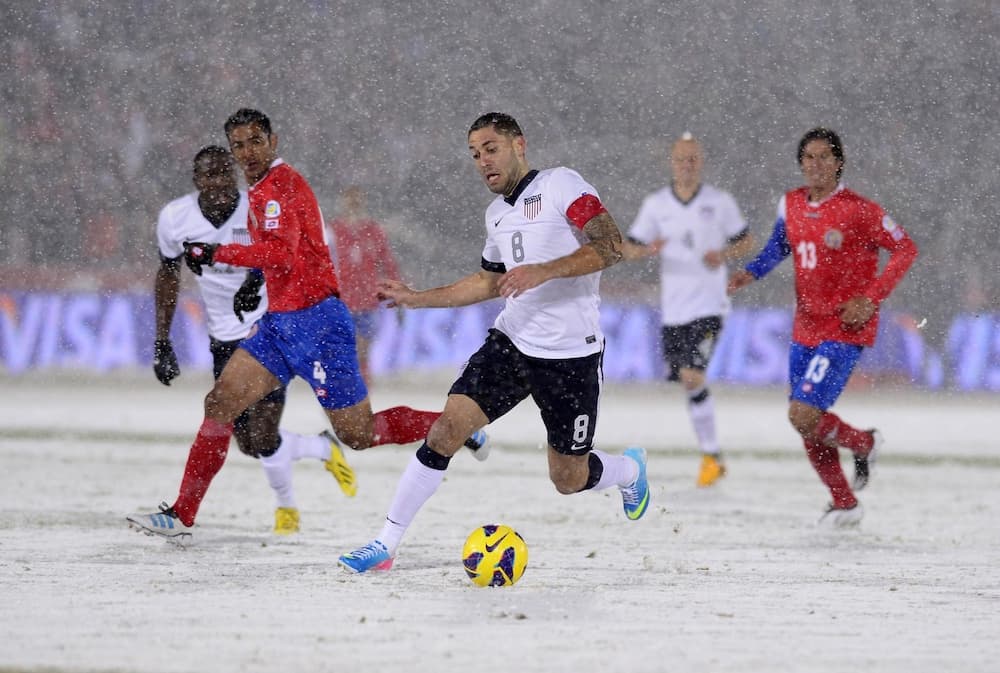
As the snow began to blanket the grass on March 22, 2013, Clint Dempsey couldn't help but wonder how much more of it would fall that night at Dick's Sporting Goods Park.
Dempsey and the U.S. men's national team were in Commerce City to play Costa Rica in the final round of World Cup qualifying that pits six CONCACAF teams against each other — also known as the Hexagonal.
A month and a half earlier, the U.S. men's team lost 2-1 to Honduras in San Pedro Sula. The Americans were back on their home soil now and looking for their first win in the Hexagonal. Earning three points at home was an important step in the Americans' quest to qualify for the 2014 World Cup, Dempsey knew, especially with a game against Mexico in Mexico City looming.
The Americans liked their chances against Costa Rica. But the snow, which would eventually cause one side to dispute that night's result, had the potential to throw everything out of whack.
"You just didn’t know how bad it was going to get," said Dempsey, who on Thursday will suit up for the U.S. at Dick's Sporting Goods Park for the first time since the game four years ago that came to be known as the "SnowClasico."
The game kicked off a little after 8 p.m. in front of a sellout crowd. The pitch was white, except for the out-of-bounds markers, penalty boxes and kick-off circle at midfield that the grounds crew had shoveled around.
Veteran U.S. defenseman DaMarcus Beasley understood that given the elements, there wasn't much room for freelancing or flair along the backline.
"Obviously the ball was going to be slick," Beasley said. "You can’t have any mistakes in the back. Always better to be safe than sorry. If you’ve got to clear the ball, clear the ball. There’s no playing around in the back on those type of surfaces. That was the mindset for the defenders. No nonsense. Make sure we keep everything tight."
The Americans got their first good scoring chance early on.
In the 16th minute, forward Jozy Altidore ripped a shot from just outside the 18-yard box. Four Costa Rican players stood between Altidore and goalkeeper Keylor Navas. The shot caromed off a Costa Rican player to Dempsey on the other side of the box — a fortunate bounce he'd take advantage of. Dempsey tapped the ball into the back of the net with the side of his foot to put the U.S. up 1-0.
"It was a lucky deflection," Dempsey said. "If I would have missed it, I would have cried all night."
Three days earlier, Dempsey had been named captain of the U.S. men's national team by then-head coach Jurgen Klinsmann. It was another notch on the belt for a player who'd grown up modestly in Nacogdoches, Texas. As a boy, Dempsey's parents made the three-hour drive from the small East Texas town to Dallas and back again so their son could play for one of the state's top club soccer programs.
During those commutes, Dempsey and his father scratched off $1 lottery tickets together and talked about what they'd do with the money if they ever won. They never did — but all those car rides eventually added up to a lucrative professional soccer career for Dempsey in England and the U.S. as well as a stint as captain for the national team.
Dempsey celebrated the goal by pounding his chest and yelling maniacally into a camera lens coated with half-melted snowflakes.
"That goal was important," Beasley said. "In a game like that, it’s scrappy. Obviously, you’re not going to play your best football because of the circumstances of the pitch. After that, it was just about battling."
The Costa Ricans had their chances in the first half. But they flubbed their best one in the 21st minute, a counterattack that could've tied things up. The score remained 1-0 in favor of U.S. at halftime. Each team headed to their respective locker rooms.
Around that time, the snow started to come down harder.
"During the game, the beginning was OK, but all of a sudden it picked up," U.S. defender Geoff Cameron said. "It was hard just to see the guys in front of you because the snow was coming down so thick."
Dick's Sporting Goods Park turned into a soccer snow globe as the second half progressed. The snow fell so hard, it stuck to midfielder Jermaine Jone's hair and turned it white. The internet called it a "sno-fro."
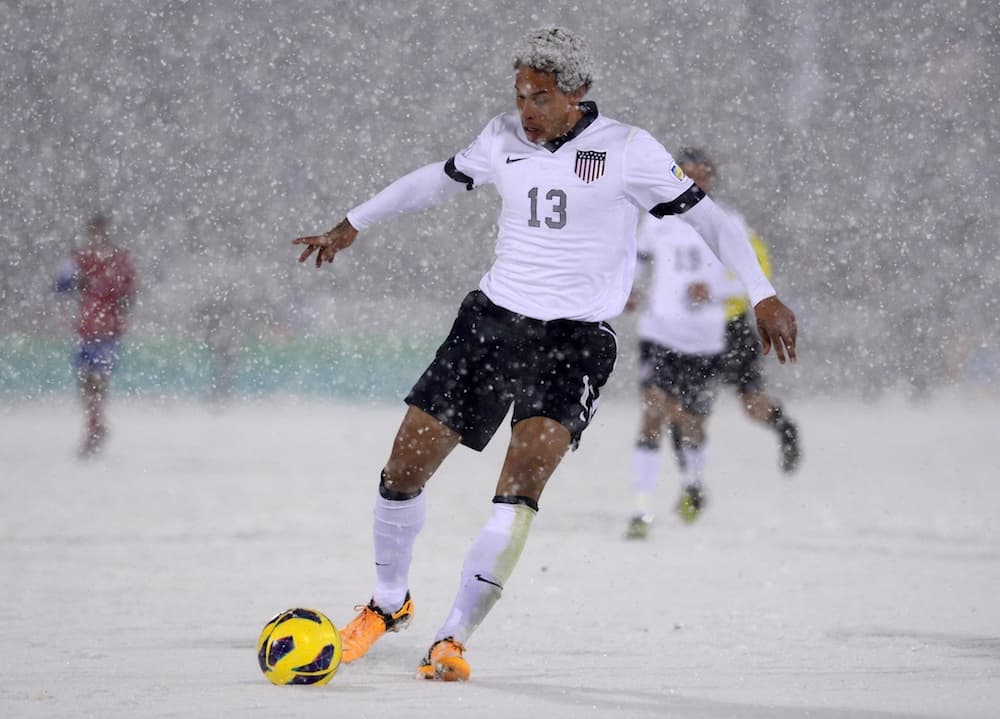
During one break in the action, Cameron was photographed playfully pushing behind a grounds keeper, who was having a difficult time shoveling a large pile of snow off the pitch.
"He couldn’t move because there was so much snow," Cameron said. "I just came behind him and tried to help him off the field."
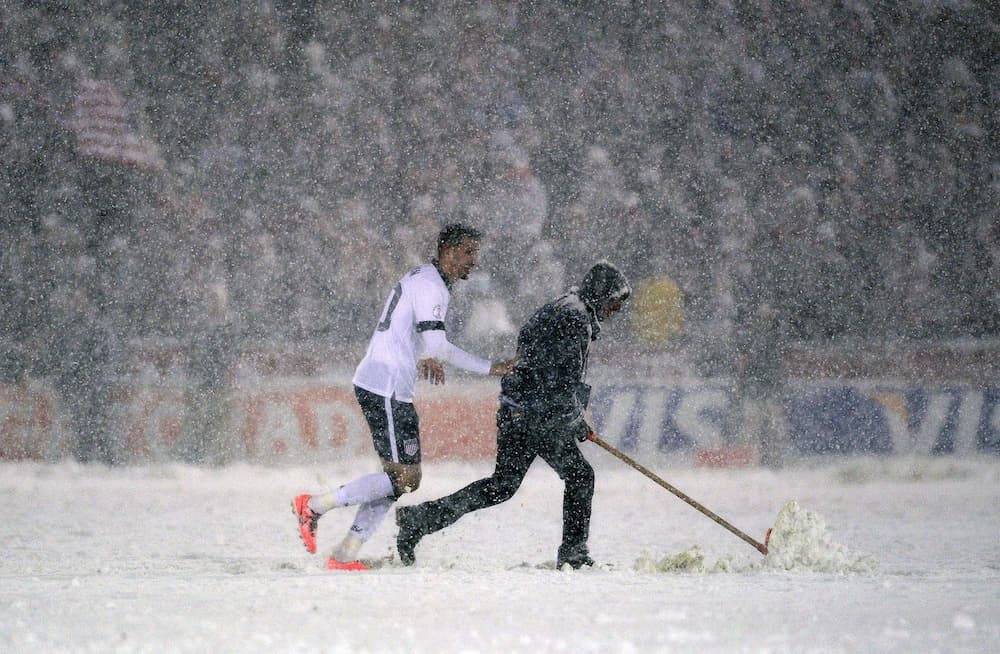
In the 55th minute, the officials stopped the match to assess if play should even continue. U.S. and Costa Rican players huddled around them. The Americans argued that if they'd made it this far, what was another 35 minutes?
"I think we all wanted to continue because you play so many minutes, and you don’t want to come back and re-do part of the game," Cameron said. "It’s the same conditions for both teams. Sometimes when we go down to Costa Rica, they make the grass longer (to slow down the game). And we play in that."
After a brief huddle with his linesmen, Salvadoran referee Joel Aguilar decided to go on. The grounds crew cleared the lines once again, and play resumed.
Costa Rica appeared to knot things up in the 70th minute. Michael Umaña headed a looping cross off the post and in. But a linesman deemed Umaña offside and raised his flag in the air to signal that the goal was no good.
The U.S. wound up hanging on for 1-0 win. The Americans mustered only one shot on goal all night — Dempsey's — compared to five for Costa Rica. It ended up being enough.
The Americans thanked the fans and frolicked in the snow once the final whistle blew. Dempsey peeled his shirt off and draped it over his shoulders.
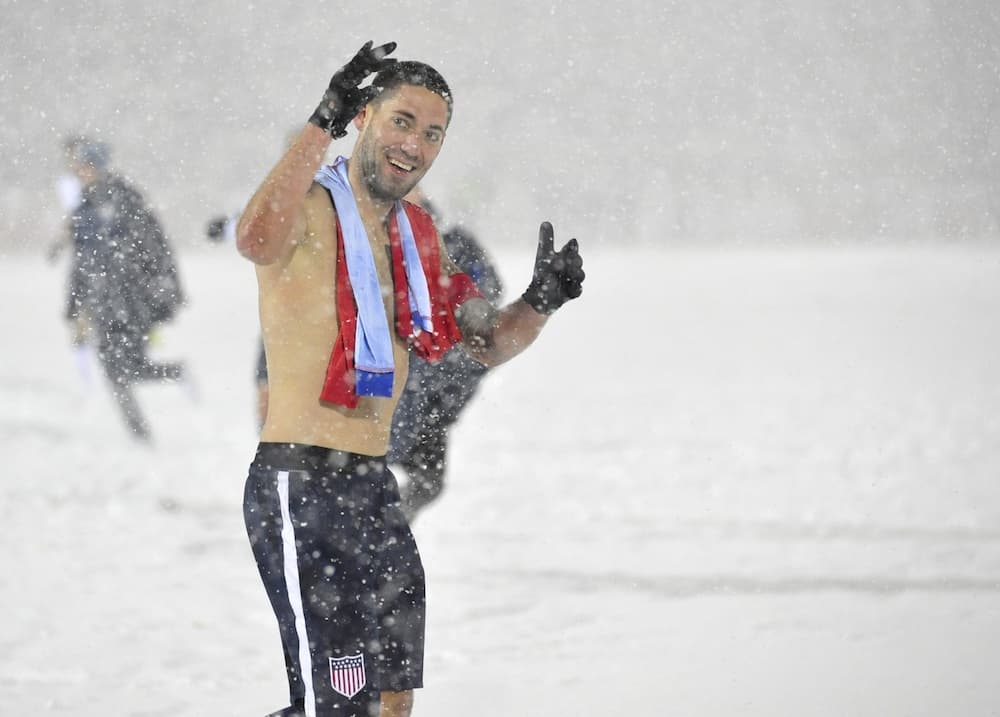
The Costa Ricans were not as pleased.
"I asked them (the referees) to stop," Costa Rican coach Luis Pinto said afterward. "They should suspend the ref. It was an embarrassment. It was an insult to Costa Rica and people coming in here."
Steven Goff, who's covered soccer regularly for The Washington Post since 1992, watched a chaotic scene unfold in the press conference area after the match was through.
"The Costa Rican federation officials were heated," recalled Goff, who privately worried that his rental car wouldn't make it to the airport for an early flight the next morning. "The U.S. soccer people were in there. There was a representative from CONCACAF.
“The funny part was that even in those conditions, Costa Rica had the better chances to score. You think of Costa Rica as a tropical country. Well, a lot of their players played in Northern Europe. So they’re accustomed to cold weather and snow."
Whether they were accustomed to that much snow is a different question. The Costa Rican Football Federation decided to protest the result. They hoped to get the match replayed, writing that "ball movement became impossible." They even suggested to FIFA that Aguilar be punished for allowing the match to continue.
FIFA denied Costa Rica's request later that week, citing a clause in its 2014 World Cup Regulations. The clause indicated that Costa Rica could've complained in writing before the match started about the field conditions. It also stated that Costa Rica could've protested "no later than two hours after the match" in writing to FIFA.
FIFA said it didn't receive an official protest until two days after the match was over.
"FIFA received a letter via email and fax from the Costa Rica FA on March 24 with regards to the 2014 FIFA World Cup qualifier played on March 22 between USA and Costa Rica,'' FIFA wrote in its decision. "The conditions established in the regulations for an official protest have not been met by the Costa Rica FA.''
The 1-0 result was upheld. The U.S. wound up finishing first in the Hexagonal with a 7-2-1 record. Costa Rica rebounded from the game to finish 5-2-3. Both sides earned automatic bids to the 2014 World Cup.
The U.S. and Costa Rica played each other once more in September that World Cup qualifying cycle. The second meeting between the two sides, which Costa Rica won 3-1, was held in the Costa Rican capital of San Jose. Costa Ricans met the U.S. team at the airport, where they chanted "no fair play, U.S.A." and egged the Americans' bus.
“The whole day, night and aftermath were just absurd," Goff said. "The U.S. Federation played with fire, so to speak, by putting the game in a location where weather could have a significant impact. That’s exactly what happened.”
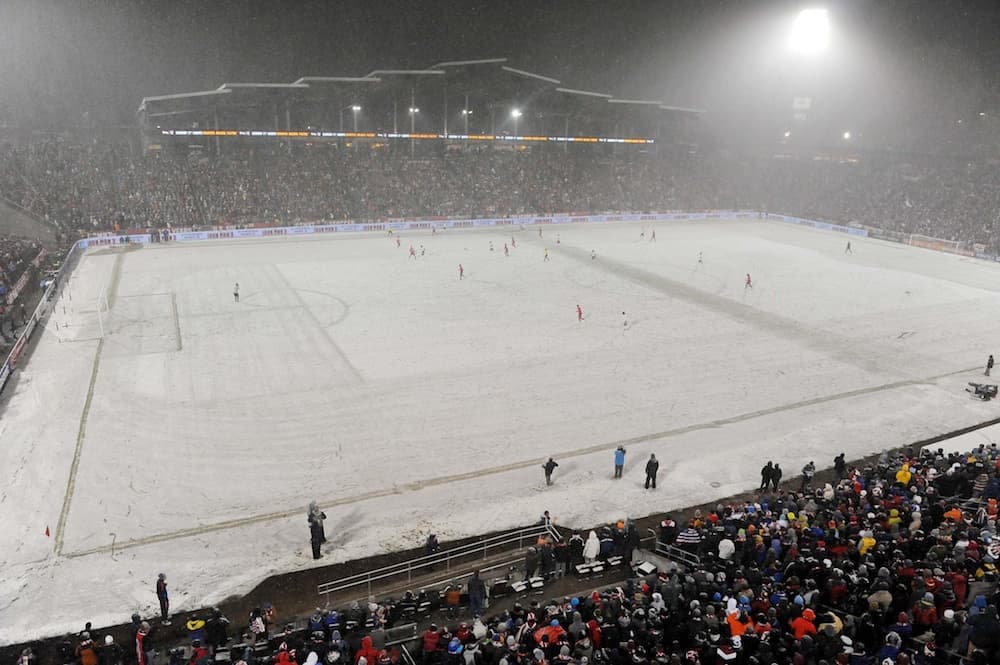
On Thursday, the U.S. will play at Dick's Sporting Goods Park for the first time since the SnowClasico.
They're scheduled to take on Trinidad and Tobago at 5:50 p.m. The Americans have gotten off to a slow start in the Hexagonal, with a 1-2-1 record in their first four matches, and once again could use a win on home soil.
Thursday's game marks the fifth Hexagonal game of 10 the U.S. will play as it tries to qualify for the 2018 World Cup in Russia. The U.S. (four points) sits in fourth place, behind Mexico (10 points), Costa Rica (seven points) and Panama (five points). The Americans' opponent, Trinidad and Tobago (1-2-0 in Hexagonal play), is last in the group with three points. The U.S. must finish in the top three in the group of six to get an automatic World Cup bid.
The U.S. has a different coach than it did the last time around; Bruce Arena was re-hired for the job in November, replacing Klinsmann. Most of the roster is different too, though there are holdovers like Dempsey, Beasley, Cameron, Michael Bradley and Tim Howard.
Dempsey, 34, now sits one goal shy of Landon Donovan’s national team scoring record of 57. He could tie or break the record at the same venue he scored his goal in the snow four years ago.
The forecast says Thursday will be 83 degrees and sunny. But if something changes, Dempsey is prepared to embrace it.
"Yeah, it was crazy," Dempsey said. "You deal with crazy things during World Cup qualifying, whether it’s snow, whether it’s flooded pitches or whether it’s playing on cricket pitches. You just never know what you’re going to deal with. It’s always a challenge. But that’s what makes qualifying for the World Cup so exciting."
Subscribe to Denverite's weekly sports newsletter here.












